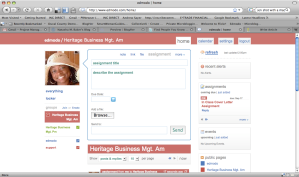
Image via Wikipedia
There is a lot of junk in blogsphere and not every post is vetted and thoroughly reviewed. Unfortunately, there is not always a clear line drawn between opinion and fact. To assist in production of high quality articles or blog posts I recommend using a peer reviewed article as a source.
What is a peer reviewed article?
In the world of academia peer reviewed journals are similar to blogs written by trusted writers. Peer reviewed journals undertake rigorous protocols in the selection and publishing of articles. Drafts of articles undergo critical review and assessment by other scholars in the author’s field before they are accepted for publication. This process is similar to the way in which a blog post is scrutinized.
For example, when a writer publishes a post on his blog, the blog’s readers weigh in (or comment) on the post. Whether positive or negative – the feedback either supports or disproves what the writer has written. Such is the process of the peer review, also known as refereeing. The reviewers are frequently not employed directly by the journal which helps to ensure objectivity and neutrality.
How to Find Peer Reviewed Articles
Google Scholar is a free bibliographic database that indexes scholarly texts, including peer-reviewed online journals. Google Scholar does not require users to a subscribe or pay a fee. Google Scholar allows users to search for digital or physical copies of articles, whether they be online or in libraries.
As a current PhD student at Walden University, I religiously use Google Scholar to research articles and publications for my assignments and papers. I find it user-friendly, accurate, and concise. One of the features that I continuously take advantage of is the link on the citation that lists other publications that cited the article in question. This allows me to see the popularity of the article and how other writers have utilized the information in the article, and sometimes guide me down different research paths that I have not considered.
How do I know is an article has Been Peer Reviewed?
I order to figure out of an article has been peer-reviewed or not you have to research the journal that published the article. The simple way to accomplish this would be to visit the journal’s website. Once you locate the publication’s website, locate the article submission section. This section will outline the guidelines for article submission which normally states whether the publication participates in the peer review process.
Giving Credit Where Credit is Due
When and if you do use a peer reviewed article in a blog post, give credit to the author. You can reference the article used, provide a link to the publication, or place a footnote at the end of your post. Citing a peer reviewed article can provide truth and credibility to your posts – which every writer can use.
Related articles by Zemanta
- Social media is changing the shape of scientific debate
- Online peer review supplements, doesn’t replace real thing
- Google Search Results Show Metadata for Scientific Papers
Filed under: Education, Human Inquiry and Science: A Research Seminar | Tagged: Academic journal, Articles, e-learning, Google Scholar, peer review, research | Leave a comment »


![Reblog this post [with Zemanta]](https://i0.wp.com/img.zemanta.com/reblog_a.png)


![Reblog this post [with Zemanta]](https://i0.wp.com/img.zemanta.com/reblog_e.png)